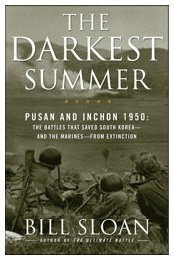Search -
The Darkest Summer: Pusan and Inchon 1950: The Battles That Saved South Korea -- and the Marines -- from Extinction
The Darkest Summer Pusan and Inchon 1950 The Battles That Saved South Korea and the Marines from Extinction
Author:
One of the darkest periods in American military history began on June 25, 1950, when hordes of North Korean troops stormed across the 38th Parallel into South Korea. The Communists' blitzkrieg-style invasion came less than five years after the end of World War II, when the United States had owned the world's mightiest war machine, but it... more »
Author:
One of the darkest periods in American military history began on June 25, 1950, when hordes of North Korean troops stormed across the 38th Parallel into South Korea. The Communists' blitzkrieg-style invasion came less than five years after the end of World War II, when the United States had owned the world's mightiest war machine, but it... more »
ISBN-13: 9781416571742
ISBN-10: 1416571744
Publication Date: 11/10/2009
Pages: 400
Rating: 3
ISBN-10: 1416571744
Publication Date: 11/10/2009
Pages: 400
Rating: 3
4.8 stars, based on 3 ratings
Publisher: Simon & Schuster
Book Type: Hardcover
Other Versions: Paperback, Audio CD
Members Wishing: 1
Reviews: Amazon | Write a Review
Book Type: Hardcover
Other Versions: Paperback, Audio CD
Members Wishing: 1
Reviews: Amazon | Write a Review
Genres:
- History >> Americas >> United States >> 20th Century >> General
- History >> Asia >> Korea >> South >> General
- History >> Military >> General
- History >> Military >> Korean War >> General
- History >> Military >> Korean War >> Campaigns
- History >> Military >> Korean War >> Personal Narratives
- History >> Military >> United States >> General




